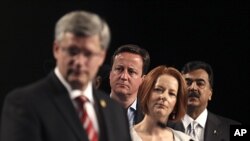Commonwealth leaders meeting in Australia are divided over the appointment of an independent commissioner for the rule of law and human rights across the group of former British colonies. An internal review has recommended that the organization appoint an impartial monitor to help members deal with issues of human rights, but the proposal is not likely to be adopted.
Commonwealth leaders meeting in western Australia agreed to give foreign ministers more power to intervene if member states deprive their citizens of human rights or threaten the judiciary or the media. Other powers agreed to would allow members to investigate allegations of vote rigging and the jailing of political leaders.
However, it is not likely that the group of former British colonies will appoint an independent human rights commissioner to ensure that early diplomatic solutions can be found to sensitive issues.
Rich countries such as Australia, Britain and Canada favor a stronger action to protect human rights, but many developing nations resent outside influence.
Some members consider the move intrusive or unnecessary. But former Australian prime minister Malcolm Fraser says it would be a mistake to abandon the idea.
"It's not something that's aimed at third world countries, because especially since 9/11 some of the developed countries I believe have transgressed quite seriously in relation to human rights in the so-called fight against terrorism, in attitudes to refugees and sometimes in relation to their attitudes towards indigenous peoples," said Fraser. "So it's not only going to be African countries that would be subject to reports, Australia would be subject to report, Canada would, and I think that would be good."
One area of agreement has been over the British monarchy. The leaders of the 16 Commonwealth countries, who have Queen Elizabeth as their head of state, have agreed to scrap outdated succession laws. New legislation will allow the daughters and sons of future British monarchs to have equal right to the throne.
Britain's prime minister, David Cameron, said the old laws were at odds with modern countries, and needed to be changed.
Other topics of discussion have included piracy off Somalia, forced marriage and efforts to eradicate the viral disease, polio.
There were also calls for Sri Lanka, the host of the next Commonwealth leaders' summit in 2013, to properly investigate war crimes committed during its civil war with Tamil Tiger rebels.
The Commonwealth summit comprises the leaders of 53 countries, most of them former British colonies. Fiji was suspended from the organization following a military coup.
Delegates will also discuss the entry of a new member, South Sudan, which recently gained independence after splitting from its northern neighbor.
The Commonwealth meeting concludes in Perth Sunday.




